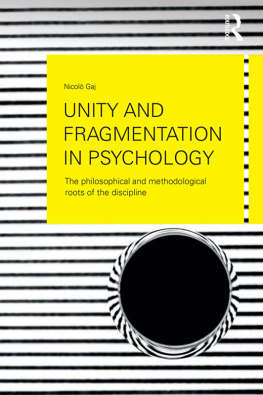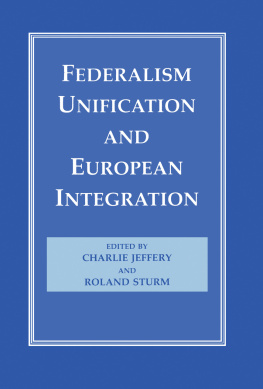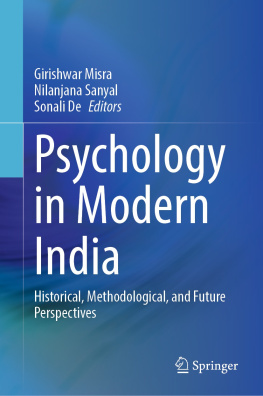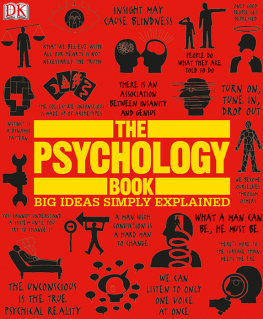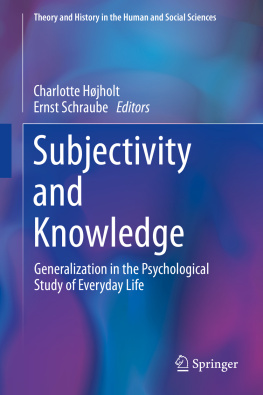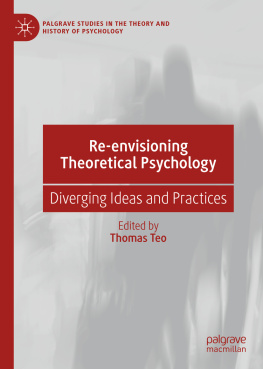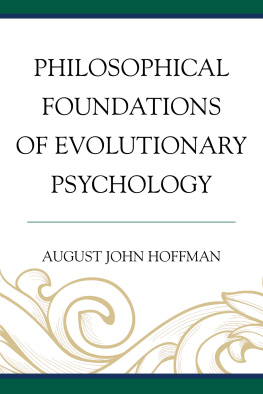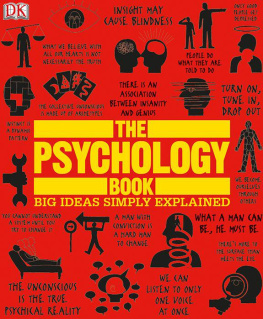UNITY AND FRAGMENTATION IN PSYCHOLOGY
The philosophical and methodological roots of the discipline
Nicol Gaj

First published 2016
by Routledge
2 Park Square, Milton Park, Abingdon, Oxon OX14 4RN
and by Routledge
711 Third Avenue, New York, NY 10017
Routledge is an imprint of the Taylor & Francis Group, an informa business
2016 Taylor & Francis
The right of Nicol Gaj to be identified as author of this work has been asserted by him in accordance with sections 77 and 78 of the Copyright, Designs and Patents Act 1988.
All rights reserved. No part of this book may be reprinted or reproduced or utilised in any form or by any electronic, mechanical, or other means, now known or hereafter invented, including photocopying and recording, or in any information storage or retrieval system, without permission in writing from the publishers.
Trademark notice: Product or corporate names may be trademarks or registered trademarks, and are used only for identification and explanation without intent to infringe.
British Library Cataloguing in Publication Data
A catalogue record for this book is available from the British Library
Library of Congress Cataloging in Publication Data
A catalog record for this book has been requested
ISBN: 978-1-138-11890-4 (hbk)
ISBN: 978-1-138-11891-1 (pbk)
ISBN: 978-1-315-65257-3 (ebk)
The search for unity in science parallels the birth of Western philosophy, from Ancient Greece to the advent of Christian monotheism (Agazzi, 2000; Cat, 2014). From the origins, philosophers and other thinkers have dealt with the object of knowledge, the phenomena of reality, whose features and interrelations are investigated with different kinds of procedures. In very general terms, at the core of the issue are questions such as: in what sense is the world, and the knowledge of it, one? Is there a unity underlining all phenomena, based on an original substance or force? Can the unity of nature be affirmed on the basis of a set of (many) original substances or forces? Is this unity reflected in the nature of procedures used to obtain knowledge about the world? These and related questions initiated the debate between the two opposing theoretical positions of monism and pluralism.
These two positions introduce the problem of the method (or methods) science should use to investigate the different phenomena of reality. Objects and methods are central concepts in the debate dealing with the unity of science: the former deals with metaphysical principles (what really exists), the latter with epistemological ones (how we know what exists).
It is plausible that the appeal of the notion of unity (of nature as well as of science) comes from the assumption that truth or usefulness is equivalent to simplicity, and unity is the quintessence of simplicity. In a traditional outlook, unity is considered as simple and plurality is not; simplicity is seen as a virtue in the scientific enterprise. From the viewpoint of scientific practice, simplicity results when there is only one conceptual system of science (Oppenheim and Putnam, 1956) that constitutes a frame for the study of all phenomena of reality. This is a methodological perspective in which simplicity is a sort of prescribing, regulating principle for the study of every kind of object: scientists should not postulate new entities or new attributes unrelated to those needed for the study of inanimate phenomena (Oppenheim and Putnam, 1956: 13).
A famous principle that warns us not to multiply theoretical entities is known as Ockhams razor. Why should we accept this principle? In the view of Oppenheim and Putnam, one reason to uphold the property of simplicity is because a simple theory is more useful than a complex one. In this case, simplicity is an indication of another theoretical virtue, namely practical utility. This is a case of epistemic simplicity: among theories with the same empirical content, scientists should prefer theories that are easier and have a simpler structure. Although the decision to use a theory doesnt mean that it is believed to be true (Kukla, 2001). Another possible answer to the previous question stems from a metaphysical view based on the presumed simplicity of the universe. In this case, the property of simplicity in a theory is advisable because it would bring us nearer to the essence of reality, that is indeed simple, i.e., reality would be composed of a relatively limited number of principles, forces, or substances which reciprocally interact. In this case, simplicity is an indication of another virtue of a theory, its possession of a truth value. This can be described as a metaphysical simplicity whereby simplicity is deemed to be a characteristic of entities and processes of the universe (Kukla, 2001). It is worth noting that simplicity itself is not an intrinsic virtue which can be valued for its own sake; rather, simplicity is a derivative virtue, a property that we are justified in seeking on the basis that it leads to an intrinsic virtue of a theory such as utility or truth. In other words, simplicity can be considered to be an index of something else.
This brief illustration of the link between the notion of unity and simplicity shows how concepts such as utility, truth, language, methodology, and metaphysics are linked to the central issue of the unity of science and how many conceptual layers make up the problem of the unity of science. The very expression unity of science hides different perspectives (Hacking, 1996). For example, the unity side of the problem deals with singleness or singularity, which means uniqueness, alterity, and diversity in comparison with something else. Unity is a feature that discriminates something valued. The concept can also be interpreted as integration, an ideal status where different parts are arranged and organized as a whole. Moreover, unity conveys the notion of harmony (Wilson, 1998) which is strictly linked to the issue of integration which in turn leads to the concept of functional interconnection where every single part has a specific and reciprocal role in the whole (Kauffman, 1995). Looking at the science side of the expression, we can find the singular as well as the plural form. From a methodological perspective, unity of science conveys that there is one, and only one, reliable way to investigate the world. The singular form (unity of science as opposed to sciences) suggests the notion of diversity and superiority of science, conceived as a compact whole, in comparison with other methods of knowledge. In contrast, unity of sciences conveys that there are many kinds of science, possibly with different objects and methods, but unified by virtue of some common ground. There are many ways to investigate the world, which nevertheless can be somehow unified, perhaps on methodological grounds.
Such a variety of points of view is similarly detectable in psychology. The fragmentation of psychology has long been identified by eminent authors (Bhler, 1927; Vygotsky, 1927) and still stimulates heated discussions among scholars. Even now, there is a significant literature dealing with the issues of unity, disunity, or fragmentation in the field of psychology (for an overview, see Yanchar, 1997; Yanchar and Slife, 1997; Sternberg, Grigorenko, and Kalmar, 2001; Goertzen, 2008). What exactly is fragmentation? What is fragmentation about? Or, conversely, what does unity mean, or what should it mean? Should we be concerned about fragmentation, or just consider the fragmentation of psychology as a matter of fact? On what grounds is psychology definable as fragmented or united? Can unity/disunity of psychology as a scientific discipline influence its social status and organization? The present work has been conceived on the grounds of these and similar questions, in the belief that a better understanding of the status of psychology as a scientific discipline would benefit its strength and efficacy, both on theoretical and practical levels.

